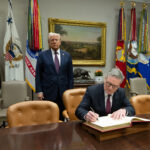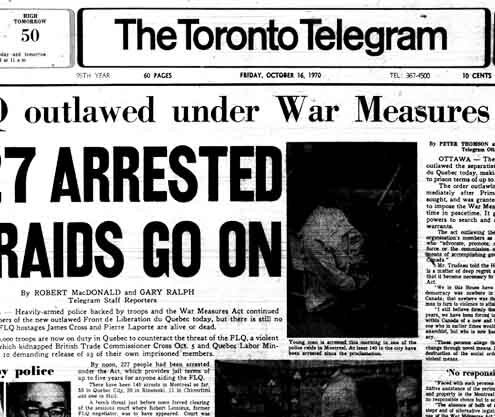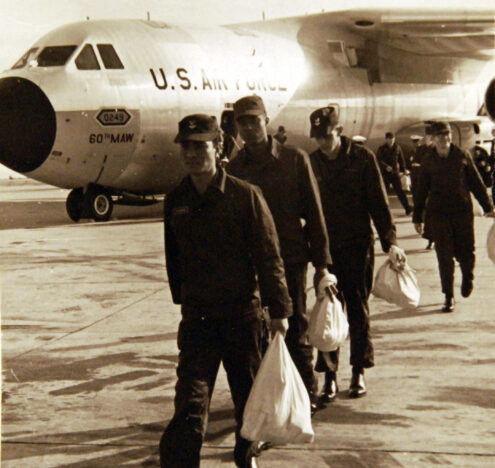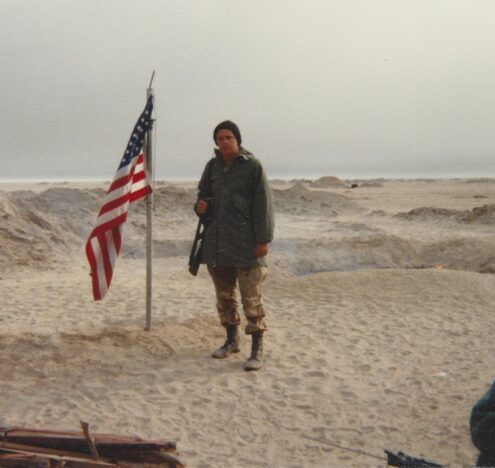Laicie Heeley is the founding CEO of Inkstick Media, where she serves as Editor in Chief of the foreign policy magazine Inkstick and Executive Producer and Host of the PRX- and Inkstick-produced podcast, Things That Go Boom. Heeley’s reporting has appeared on public radio stations across America and the BBC, where she’s explored global security issues including domestic terrorism, disinformation, nuclear weapons, and climate change. Prior to launching Inkstick, Heeley was a Fellow with the Stimson Center’s Budgeting for Foreign Affairs and Defense program and Policy Director at the Center for Arms Control and Non-Proliferation. Her publications include work on sanctions, diplomacy, and nuclear arms control and nonproliferation, along with the first full accounting of US counterterrorism spending after 9/11.
- is_single_v1Wikimedia CommonsMahmoud Khalil became the face of Palestinian rights at Columbia University when the Syrian-born refugee refused to wear a mask and negotiated on behalf of the encampment with the University administration. Now the US wants to deport him using a deep-cut statute in the immigration act that gives the Secretary of State sweeping powers to[...]
- is_single_v1Saw WunnaIf you live in the US, buying a gun can be as easy as going to Walmart. In countries with strict gun laws, such as most of Europe or Australia, you need a little more ingenuity. Although not that much more: since March of 2020, anyone with access to a cheap second-hand 3D printer and[...]
- is_single_v1Glen BledsoeNearly everyone has played dress up at some point in their lives, whether putting on mom or dad’s clothes as kids, for Halloween, as their favorite Marvel character at ComicCon… or even, maybe, as a Civil War soldier. Gettysburg, Pennsylvania, where historians say Civil War casualties were highest, attracts many reenactors. They carry their muskets,[...]
- is_single_v1Irvin ZhengInitially assigned to $100 million bank failure investigations, Mike German’s FBI career took a pivotal turn in 1992, when he went undercover to infiltrate neo-Nazi groups in LA. The years that followed gave him a front-row seat to the Justice System’s handling of domestic terrorism from the 1990s to his departure in 2004. When Mike[...]
- is_single_v1True to his promise, on the first day of Donald Trump’s second term as president, he pardoned more than 1,500 people charged in connection with the attack at the Capitol on Jan. 6, 2021 — an event many observers accuse him of instigating. He also commuted the sentences of the six organizers of the riot,[...]
- is_single_v1Dave HuntAmy Cooter has been studying US militias since 2008 when, as a graduate student in Michigan, she attended a public meeting of a group that was thought to be a cover for an underground neo-Nazi movement. As it turned out, that assumption was wrong. It was then that Amy realized this militia movement she encountered[...]
- is_single_v1This season on Things That Go Boom, we’re starting in Canada, because four years after January 6th, we want — we need — to understand our own divide. In 1970, Canada’s streets were full of troops and the country was on edge. Quebec cabinet minister Pierre Laporte had been captured by a militant French separatist[...]
- is_single_v1Anthony CriderWhen Members of Congress are sworn into office, they say an oath. To protect the country from all enemies… foreign and domestic. But what does a domestic enemy look like? And how can they be stopped? Four years after January 6th, we're turning our eyes on the US to ask, “in our divided times, how[...]
- is_single_v1When former US Navy Intelligence Officer Andrew McCormick spent the holiday season in Kandahar in 2013, attempts at holiday cheer were everywhere. But few were more out-of-touch than the generic care packages sent from civilians who knew nothing about him — or the war he was fighting. Part of our series of monologues in partnership[...]
- is_single_v1One night In 1968, Ed Meagher was finishing his last shift at Clark Airways, which included authenticating and repeating messages for the nuclear-armed B-52 fleet in Southeast Asia. Then his phone lines started dinging, with signal after signal — and he couldn’t figure out why none were a match. This monologue is the second in[...]
- is_single_v1This month on Things That Go Boom, we’re passing the mic to three veterans to share their memories in their words. In this first entry: When paratrooper Bill Glose came home from the Gulf War after leading his platoon, silence was his fortress. That all changed when a friend told him to start writing poetry.[...]
- is_single_v1Roya Ann MillerAfter a season spent examining feminist foreign policies around the world, we turn our attention back to the US. Will the US adopt a feminist foreign policy? And what would that mean? In this episode, three remarkable activists, organizers, and academics share their perspectives on where we are in the process, what the obstacles are,[...]

























